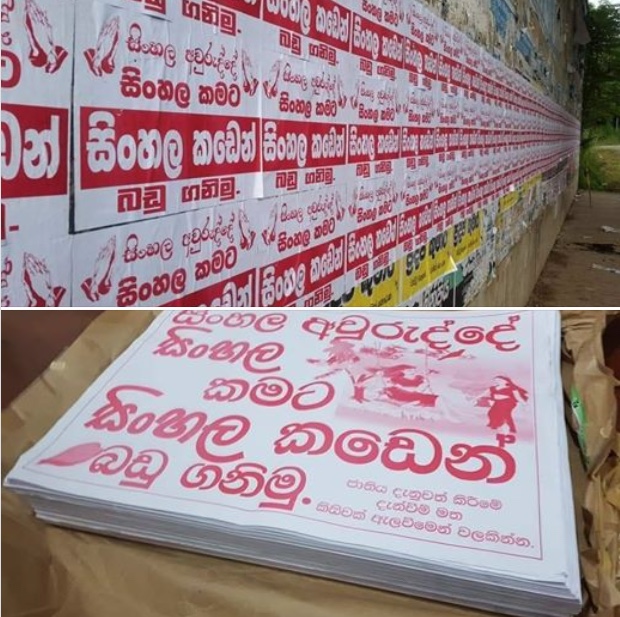A Brief Colonial History Of Ceylon(SriLanka)
Sri Lanka: One Island Two Nations
A Brief Colonial History Of Ceylon(SriLanka)
Sri Lanka: One Island Two Nations
(Full Story)
Search This Blog
Back to 500BC.
==========================
Thiranjala Weerasinghe sj.- One Island Two Nations
?????????????????????????????????????????????????Monday, April 8, 2019
‘Titanic Sri Lanka’ Rocking Again – Take Heed!

 The
terrible Titanic disaster over a century ago, today stands as a
memorial to mankind’s over-confidence in technology and a reminder of
how weak we are compared with the forces of nature. Captain Smith, the
man directly responsible for the loss of Titanic, failed to heed timely
warnings. Metaphorically, after the end of the war in May 2009, euphoric
Sri Lankans built a Titanic filled and decked with immense hope and
aspirations for a united, peaceful and prosperous Sri Lanka, to take
them to their dream destination. Not even two years in voyage, Rajapaksa
too, like Captain Smith, made many serious mistakes, ignoring distress
signals. Throwing all caution to the winds, he allowed many corrupt and
the racist elements to virtually hijack his engine control room and have
their hands on his steering wheel. Titanic thus gradually began to
sink, leaving the people of Sri Lanka in dire straits in mid sea
,isolating their country in the international arena. Then in 2015, the
passengers commenced another Titanic voyage under new Captains, to
travel to their dream destination. Four years in voyage, Titanic once
again is rocking, sending distress signals and Maithri/RW are proving
themselves to be another set of Captain Smiths, if not worse. Will we take heed?
The
terrible Titanic disaster over a century ago, today stands as a
memorial to mankind’s over-confidence in technology and a reminder of
how weak we are compared with the forces of nature. Captain Smith, the
man directly responsible for the loss of Titanic, failed to heed timely
warnings. Metaphorically, after the end of the war in May 2009, euphoric
Sri Lankans built a Titanic filled and decked with immense hope and
aspirations for a united, peaceful and prosperous Sri Lanka, to take
them to their dream destination. Not even two years in voyage, Rajapaksa
too, like Captain Smith, made many serious mistakes, ignoring distress
signals. Throwing all caution to the winds, he allowed many corrupt and
the racist elements to virtually hijack his engine control room and have
their hands on his steering wheel. Titanic thus gradually began to
sink, leaving the people of Sri Lanka in dire straits in mid sea
,isolating their country in the international arena. Then in 2015, the
passengers commenced another Titanic voyage under new Captains, to
travel to their dream destination. Four years in voyage, Titanic once
again is rocking, sending distress signals and Maithri/RW are proving
themselves to be another set of Captain Smiths, if not worse. Will we take heed?
The measure of a country’s stature and quality is gauged by the quality
of its’ leaders. Our present narcissist Head of State and the bunch of
clueless and pointless public representatives from the PM downwards,
representing the people of this so- called Dharma Dweepa in the House by
the Lake, however provides no positive credence that Sri Lanka
presently enjoys a credible image among the community of nations. Fish
rots from the top, and unruly and undemocratic events which followed
after the constitutional coup in October 2018, engineered by Maithri was
just a prime example of the decaying political culture. The country
rightly recoiled in shame when this head crackpot, in the aftermath of
that political coup,divulged with admirable candour what had gone awry
with his Plan A with Rajapaksa: how offers of millions and ministerial
posts did not appear to engineer prospective
“crossovers”. Sri Lanka has thus become a diseased nation with its’
moral fibre being corrupted to the core, ably facilitated by a losing
credibility of a political and also a religious leadership. In
this grim scenario, it is thus an open secret that mass dissatisfaction
and frustration about the way the country being ruled and governed, has
been growing at an alarming rate. However, sadly this mass
dissatisfaction has not given rise to more articulate expression within
the country and public activism to hold their rulers to account has also
not been to the expected levels. The people are still seeking
alternatives along the widely despised two party continuum, despite
bitter lessons learnt. How ironic!
There seem to be no shortage of political drama and spectacles in the
corridors of power. Even parents cover their children’s eyes when
footage from the Parliament, appear on TV or teachers do so when kids
unwittingly watch the proceedings of this ‘House of Hell by the Lake’,
from the public gallery. Proceedings are regularly disrupted by MPs’
disgusting unruly behaviour and MP’s free flowing filthy verbosity
compels the Speaker to regularly expunge them from the Hansard. Their
contributions during debates are mostly ‘out of point’ and not relevant
to the subject under discussion, when compared to the quality of
debating during NM Perera/Felix DB/Colvin days (which we followed with
much enthusiasm). The worse possible scenes were witnessed by the nation
during the constitutional crisis in October 2018 when
the ‘law makers’ ( law breakers) were engaged in fistfights, flinging
furniture, drawing knives, and throwing chili pepper at ostensible
opponents in the chamber.
Ironically, Maithri preached about moral values to the world, when he made a candid statement at the UNGA in New York in
2016. He then pointed out that ‘in many parts of the world we see the
unfortunate proliferation of anger, hatred, and brutality. The
contemporary society is experiencing a crisis of morality. I believe
that all States should pay heed to the cry for moral values. I believe
that every society must dedicate itself to raise its share of positive
moral values”. Perhaps, those words were not meant to be translated into
action domestically! Moral compass has been declining since Independence,
with this country being driven along a divisive path, with Tamils and
Muslims made to feel like second class citizens while the grievances of
the Sinhala people also on the increase. Thus, the entire feels cheated
by this corrupt political class.
One of the most unfortunate crises of our time is how hate and bigotry,
consciously used as a political tool have divided communities which have
lived in amity for centuries. Hate is not inherited; but learnt as the
world digested this reality since WWII. Whether it was Hitler’s holocaust, Ruwandan genocide, the massacre in Norway in 2011 or this year in Christchurch, New Zealand, or in Sri Lanka, the 1983 anti-Tamil program,
Aluthgama/Digana anti Muslim communal violence in 2014/2018, the hate
mayhem and killings did not just happen. It arose from the feeding of
hate, irresponsible language and the demonising of people based on
differences – colour, race and religious. The real cause was the
build-up of prejudice, hate, and a passion for violent action, aided and
abetted by self-centered
political and religious leaders as well as some sections of the Media,
who exploit fear and ignorance for their narrow gains.
Today, sadly, in Sri Lanka, the bitter lessons of 1983, Aluthgama and Digana communal
violence have not been learnt and therefore once again the nation can
see racist sparks emerging out of the mouths of politicians in and out
of Parliament and some sections of the Media as well as hate peddlers in
the social media, as in the case of Wilpattu deforestation
issue. This Wilpattu issue crops from time to time in public discourses
when there are narrow political objectives to be achieved. No one in
the right senses will object to any individual belonging to any
community being punished for destruction of valuable forest resources.
However, it is shameful that these public discourses seem to be having
racist undertones and harp on the nationality of the Minister and the
community he hails from, more than debating on the real issue of
deforestation. Then again, problem of deforestation is not confined to
Wilpattu, but even in Sinharaja, and in other forest reserves too. Many
other forest lands have also been reclaimed for several development
projects as well (Moragahakanda, Kalu Ganga, Uma Oya, Maduru Oya for
example) which are conveniently ignored. This deforestation issue hence,
is a very critical issue which should be taken as a holistic issue
rather than a selective one. Thus, there are ulterior motives in
bringing only this Wilpattu issue with racist undertones at this time.
Besides, when the Sinhala and Tamil New Year draws closer, many hate
posters have begun to appear on city walls in many areas asking the
people to buy only from Sinhala shops, indirectly launching a boycott on
Muslim shops. The culprits can be easily identified and punished; but
this does not happen due to lack of political will and indifference of
the law enforcement authorities.

